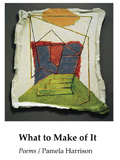June 15, 2013WHAT TO MAKE OF IT
Review by by Anne Harding Woodworth
Turning Point Books
P.O. Box 541106
Cincinnati, OH 45254-1106
ISBN 978-1936370900
2012, 88 pages, $18.00
www.turningpointbooks.com
“I never dreamed how much/ I needed language to sustain myself.” So states Pamela Harrison in one of my favorite poems in this collection that takes a refreshingly honest look at a marriage. I’ve met Harrison two or three times, but I know her really through her poetry. In her earlier book, Out of Silence, I discovered a woman who cries out to reveal the once-secret memories of her childhood. Perhaps I appreciate Harrison as much as I do because I always find something of myself in what she has to say. Shouldn’t that happen with most poetry?
In What to Make of It, Harrison sometimes writes in first person, sometimes in third, but always in a compelling chronology. Trying to figure out what to make of her marital life, she orders her memories in three sections of captivating narrative poetry that doesn’t abandon the lyric.
She begins with college life in the sixties, the Vietnam War years with the necessary protests, beards, and sleeping on beaches. There’s travel to Finland, Africa, starting a family—all informing the restlessness of youth combined with youth’s earnestness of purpose. Her husband is a medical student, resident, later a doctor, who himself with “stricken legs” eventually goes in search of a healer.
The second section is an account of settling down and child rearing. We see a young woman completely in love, eager to make a home for her man, to “bend with the winds/ of her husband’s questing need.” They buy a fixer-upper in Maine, and in retrospect the poet sees the husband’s life—most likely the whole marriage—
pass entirely to mending—all catch-up in the
keeping of that decrepit heap she loves: every free
day lost to tearing off cracked clapboard, jacking up
the blighted sill, sawing out the rot.
Yes! Go for the metaphor wherever you look. And Harrison does just that. In “Clear Through” she asks: “When was the world rewritten in code?” Water, for instance, which featured prominently in Out of Silence, is often a code in this collection, whether it’s a river, a sea, rain, or tears. Water becomes the world: it “fills her filmy hope with weight and necessity:/ their home, beside that singing stream.”
After a while, disquiet torments the poet, putting me on edge, too, so that I had to read on. Describing a walk in the woods, she says, “I wait in a stillness stabbed/ with absence.” And in “Mud Season” she senses her husband’s unrest:
Lonely misfit, you settle
for tinkering at home, longing for community
of fellows.
The strife intensifies.
My husband hangs in the living room,
nailed to the wall by a viciousnessI save for those I love.
But husband and wife reach out into the world again. In Honduras the poet sees her “husband at his best, doing work/ natural to him as breathing,” and the marriage takes an auspicious turn into a mutual acceptance of their union, which most likely would be called, well, yes, love. And love is the subject of the third section.
By now the husband’s legs are quite impaired. They go to Mexico, where water is integral to their life. They go swimming together, he being assisted by his “Aqua Jogger,” and, unnoticed, they witness the powerful motif of a baptism in the sea.
What to Make of It is more than memoir. It is a search through a telling in verse. Harrison seeks to tell through her language—needed to sustain herself—what to make of what has been, and is, her marriage. And she succeeds, ever so wisely and honestly, right up to the happy ending. In the penultimate poem, “Almagest,” husband and wife swim in a cave-like cenote in Mexico:
&nbps; &nbps; &nbps; &nbps; &nbps; &nbps; &nbps; &nbps; &nbps; &nbps; &nbps; &nbps; You
looking your way, I looking mine, we float with our
heads together at the circle’s center, listening to the
music of the sphere. Oh, love, there never was a
better world.